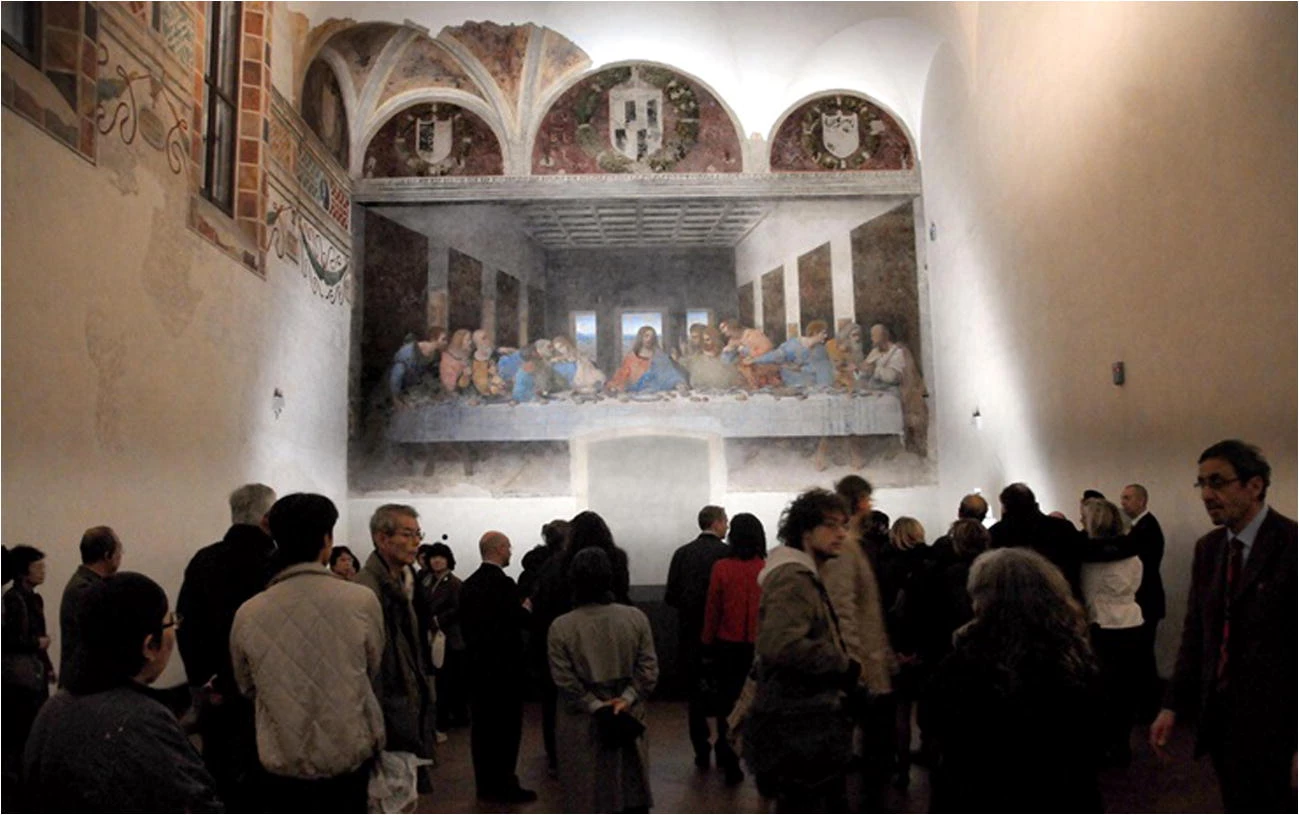Leonardo da Vinci is one of the renowned artists whose artworks can still be traced by the current generation. The artist mainly dwelt in painting, sculpturing, drawing, among other artworks. The main reason for focusing on the artist is his ability to integrate the human perspective using various art techniques. Additionally, he was the first artist to incorporate biblical stories into visual arts. Therefore, I chose Leonardo da Vinci because of his painting The Last Supper or Il Cenacolo, which is a biblical illustration that employs various techniques of art such as gesture, form, and balance.
The main thing that draws people to The Last Supper is the skillful display of every disciple’s specific reaction to the news. One can deduce the disciples’ emotion from everyone’s response to the news that one of the people present would betray Jesus Christ. The portrait illustrated Jesus’ final supper with his followers when he was about to be betrayed by one of his disciples. Moreover, drywall for painting makes it interesting since traditionally, the Italian artists were mainly painting on wet plaster (Bahreynian et al. 40). Furthermore, Jesus and the 12 disciples sit on a long table in a spacious and simple room (see fig. 1). The lack of obstruction in the picture and the simplicity of the room used in the image depict the drama of the event.

Additionally, in this image, all the psychological and compositional focus is on Jesus. Although the disciples look surmised on the news, Jesus remains calm in the picture. The illumination of the light from the main window makes Jesus stand out from the crowd. Moreover, the head of Jesus is the focal point among other parts by converging linear perspectives into the composition. Therefore, the artist’s strategic use of psycho-dimension and 2D focus is distributed equally into the painting. As a result, the drama in the picture is enhanced, thus making it relevant to the context.
Furthermore, form and gesture have been keenly used in the portrait to unify the 12 disciples in the four groups. The followers are organized into groups which are composed of three disciples each, and the groups are distributed equally in each side of Jesus. Da Vinci seems to have gone against the traditional iconography that was widely used to illustrate the drama in the picture (Bahreynian et al. 38). The drama is further depicted with the presence of Jesus in the middle of the table. A man carrying a bag of money in his right hand is seen seated on the left side of Jesus, and this is an indication he is Judas, the betrayer of Jesus. The disciples sitting at both ends of the table seem to be calmer than the rest of the followers, which helps contain the energy in the painting. However, the intensity of the portrait increases as the disciples get closer to Jesus. The latter seems to be aware of the situation and is rarely bothered by others’ actions. One might conclude that the disciples are experiencing psychological disturbance since their reactions in the picture range from fear to horror because they don’t believe that one of them could betray their own.
Another factor that draws me to the artwork is the manner in which the picture portrays the actions. There had never been any artistic painting before to illustrate the activities in the room where the last supper occurred. However, Da Vinci uses the events described in the Bible to bring a visual image of what could have happened in the closed room. During the meeting, Jesus was telling his disciples that one of them was going to betray him in a few hours (Bahreynian et al. 40). Therefore, Da Vinci uses different painting techniques to demonstrate the emotions that every individual present in the room could have portrayed, including Judas Iscariot, who can be clearly distinguished in the crowd. Most importantly, it illustrates the followers’ instant reaction when he immediately revealed the information to his disciples.
I think the painting is more informative than just what people see. It has a much deeper meaning than the apparent displays that are seen at first glance. Through this art piece, Da Vinci demonstrates his exceptional capability to integrate his knowledge of the observable world into a religious scene’s visual representation. He exhibits a successful creation of a compelling and complex psychological piece of art.
Succinctly, The Last Supper, created by Leonardo Da Vinci, is an outstanding piece of art. It uses various techniques of painting to demonstrate an action that is only described in writing. The artist balances form and gesture to reveal the picture’s emotions and mood (Bahreynian et al. 40). Although there are many paintings that Da Vinci created, The Last Supper illustrates fine usage of art. The image has an inner meaning that can only be identified when an individual is keen enough. Therefore, Da Vinci’s work of The Last Supper is still appealing, although it was painted several centuries ago.
Works Cited
Bahreynian, Mahsa Sadat, et al. “Representation of The Last Supper by Leonardo da Vinci in the Postmodern Era Using the Abstract-Minimalism Approach.” The Monthly Scientific Journal of Bagh-E Nazar, vol. 14, no. 51, 2017, pp. 33-44.
Motta, Oriana, et al. “Leonardo da Vinci’s “Last Supper”: A Case Study to Evaluate the Influence of Visitors on The Museum Preservation Systems.” Environmental Science and Pollution Research, 2021, pp. 1-8.